
بِسْمِ ٱللَّٰهِ ٱلرَّحْمَٰنِ ٱلرَّحِيمِ
بِسْمِ ٱللَّٰهِ ٱلرَّحْمَٰنِ ٱلرَّحِيمِ
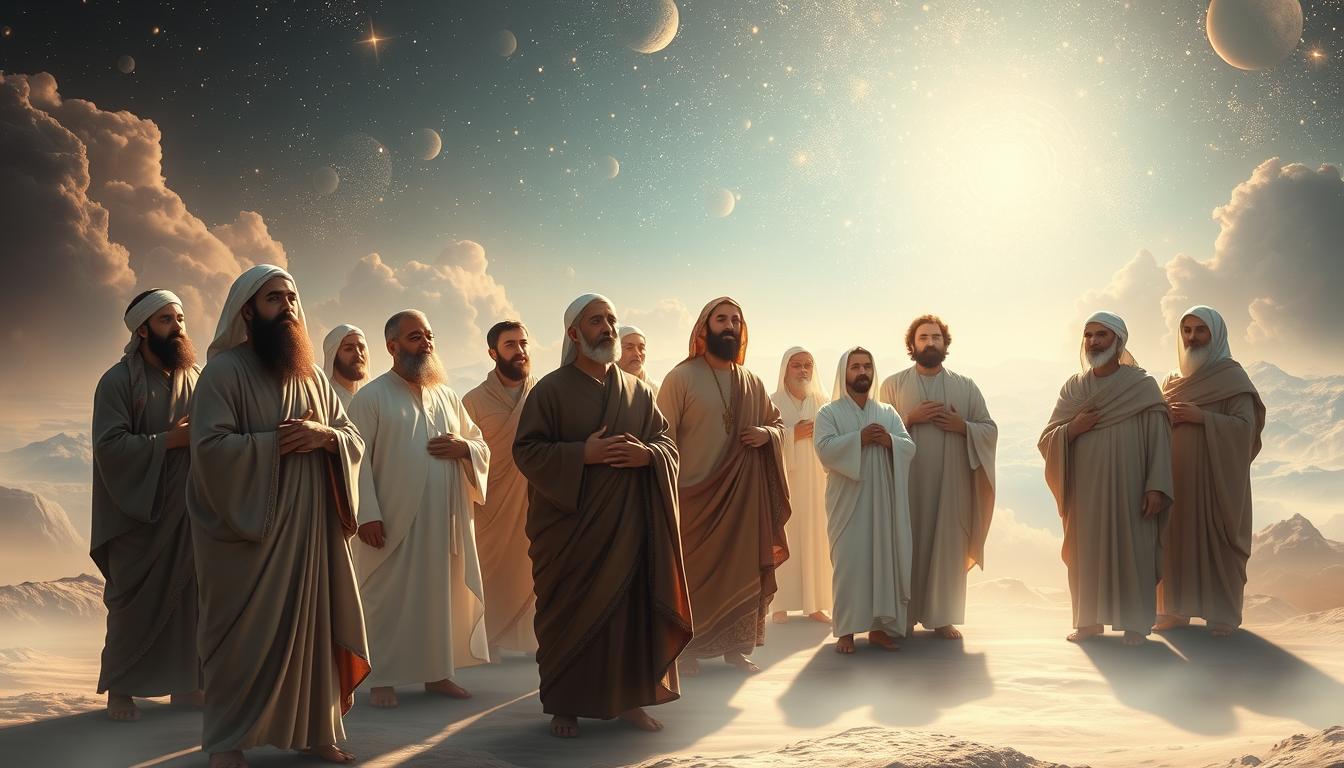
Major Prophets of Islam: We start our journey with the major prophets in Islam. Their messages and lives have shaped the faith of millions. The prophets in the Quran are more than just historical figures. They are guides and role models whose stories inspire and educate us.
From Prophet Noah’s steadfastness to Prophet Moses’s leadership, each prophet’s story teaches us valuable lessons. These lessons help us understand the human condition and the divine message.
Exploring the roles and significance of these prophets deepens our understanding. We see the continuity of divine messages throughout history, beautifully shown in the prophets’ family tree. It enriches our appreciation of our spiritual heritage, connecting us across cultures and time.
Prophethood is a key part of the Islamic faith. It connects believers with God’s message. In Islam, prophets are seen as messengers of God, leading humanity to the right path.
In Islamic terms, a prophet is called a “Nabi” or a “Rasul.” These terms are often used the same way, but there’s a small difference. A Nabi is a prophet who gets revelations from God. On the other hand, a Rasul is a messenger with a specific message or scripture to share with people.
The main goal of divine messengers in Islam is to guide people to worship one God. They also offer moral and spiritual guidance. Prophets are chosen by God to share His message with humans, connecting the divine and human worlds.
Islamic tradition says there have been many prophets throughout history. A hadith mentions God sent 124,000 prophets, but only 25 are named in the Quran. The prophets in Islam are seen as the best of humanity. They were chosen for their righteousness and ability to share God’s message.
| Prophetic Term | Meaning | Role |
|---|---|---|
| Nabi | Prophet | Receives revelations from God |
| Rasul | Messenger | Entrusted with a specific message or scripture |
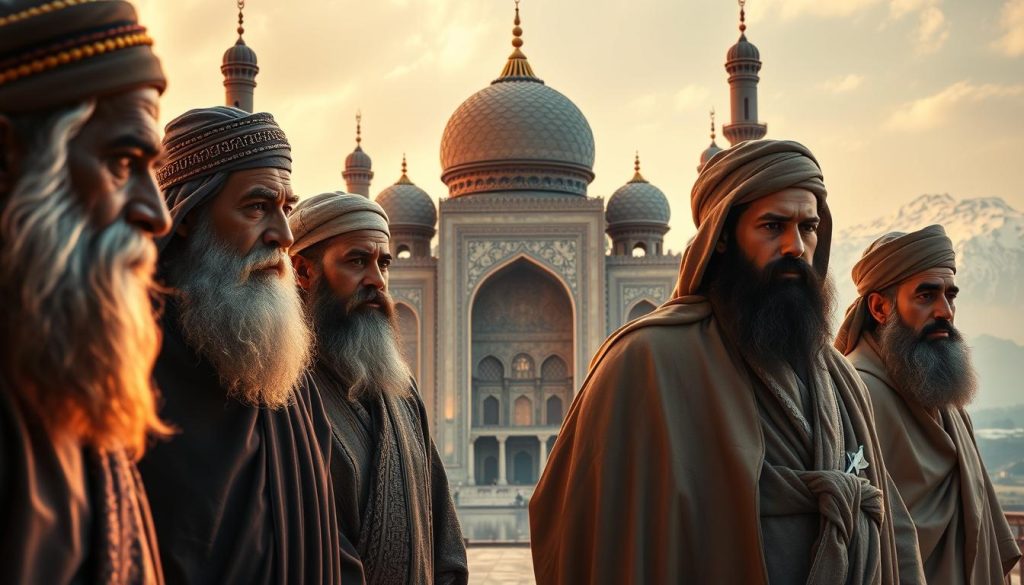
Understanding prophethood is key to understanding Islam. It shows the importance of divine guidance in our lives and highlights the role of prophets as messengers between God and humanity.
The story of Prophet Adam is key in Islam, teaching us about faith and staying strong. Adam was the first human made by Allah. His story is about following rules, making mistakes, and finding forgiveness.
Islamic teachings say Adam was made from clay and came to life when Allah breathed into him. This shows humans are special, having Allah’s spirit. Adam was not just the first human but also the first prophet, given the duty to care for the earth.
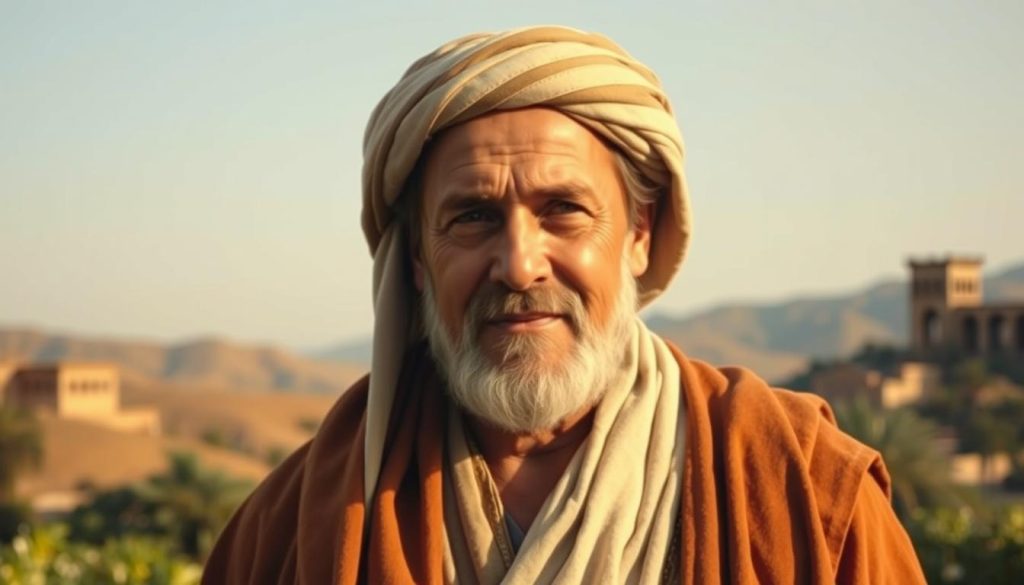
Adam and his partner, Hawa (Eve), lived in paradise but were told not to go near a particular tree. Satan tempted them, and they disobeyed, falling from paradise. This story teaches us about human weakness and the need to seek forgiveness.
Even after falling, Adam’s story is one of redemption. He truly repented, and Allah forgave him. This shows that making mistakes is normal, but seeking forgiveness is key. Adam’s legacy reminds us of Allah’s mercy and our chance to learn from mistakes.
Adam’s story reflects our own battles and the quest for guidance and forgiveness. His tale, among the major prophets of Islam, inspires and guides believers on their spiritual path.
The story of Prophet Nuh is a powerful reminder of the importance of faith and resilience. It shows the unwavering commitment needed to fulfil a divine mission.
Prophet Nuh was given a critical message: to remind his people of the one true God. Despite facing harsh opposition and ridicule, Nuh stood firm. He was like other prophets, such as Prophet Ibrahim and Prophet Musa, who also showed great determination in their beliefs.
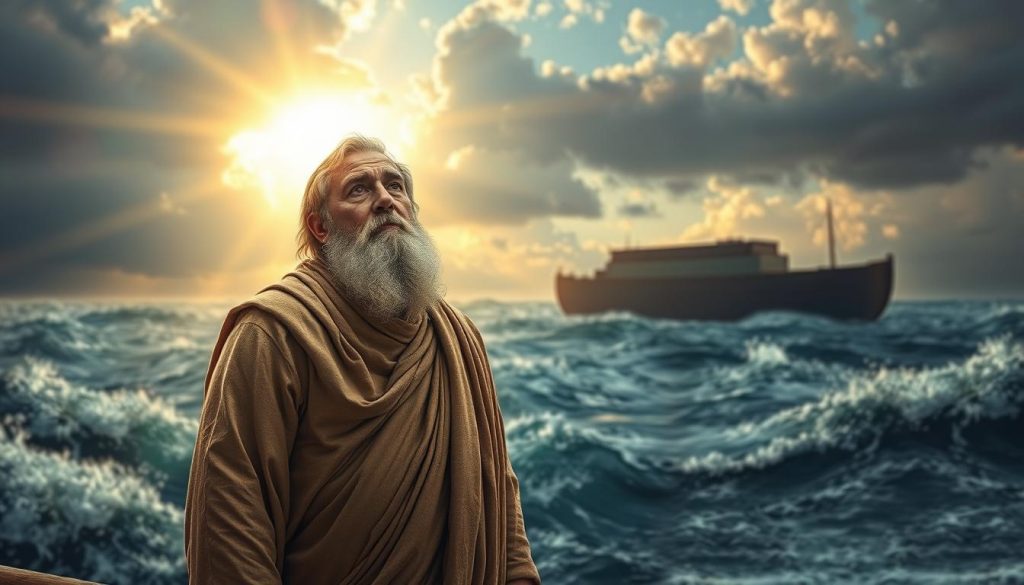
The great flood story is a key part of Nuh’s mission. The Quran tells us that Nuh’s people refused to give up their idols, leading to divine judgment and a massive flood. The flood was not just a punishment but also showed God’s mercy, as Nuh and his followers were saved.
Nuh’s perseverance teaches us valuable lessons. Like Prophet Isa’s story, Nuh’s story highlights the importance of faith and trusting in God’s plan. The table below summarises key aspects of Nuh’s story and their spiritual implications.
| Aspect of Nuh’s Story | Spiritual Implication |
|---|---|
| Nuh’s Call to Monotheism | Importance of standing firm in faith |
| The Great Flood | Consequences of disobedience and God’s mercy |
| Nuh’s Perseverance | Value of patience and trust in God |
Reflecting on Nuh’s story reminds us of the lasting themes of faith, determination, and divine justice. These themes are core to Islamic teachings and in many prophetic stories.
Ibrahim’s journey to monotheism is a powerful story in Islam. It is a key part of the faith for Muslims worldwide.
Prophet Ibrahim searched for the truth deeply. He questioned his people’s beliefs and sought divine guidance. His journey is a model for Muslims to question and seek knowledge.
Ibrahim found monotheism and called others to it. He was a prophet who taught the message of one God, against idolatry and polytheism.
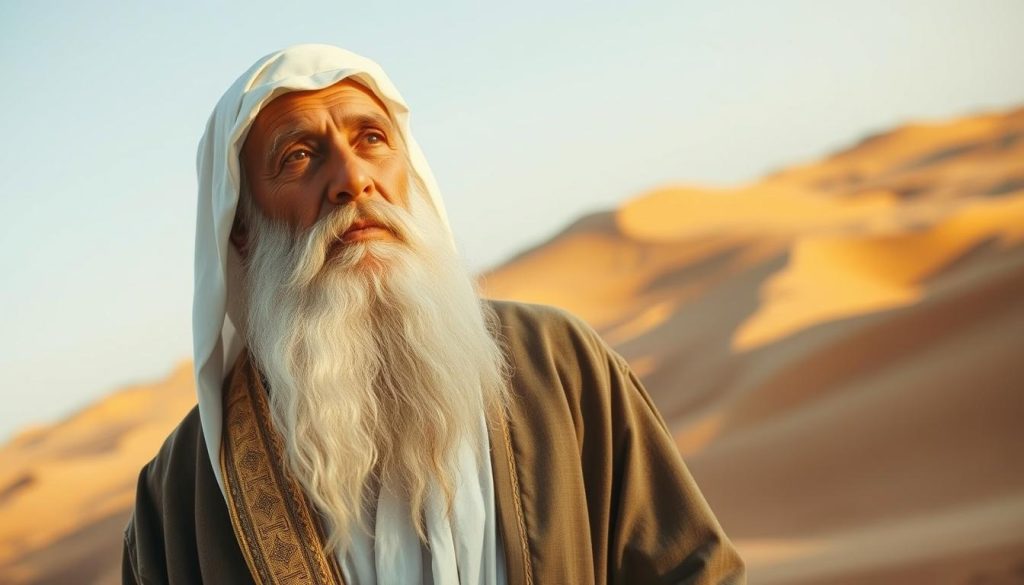
Prophet Ibrahim built the Kaaba in Mecca. This sacred site is the house of God and a key point for Muslims during the Hajj.
The Kaaba’s construction by Ibrahim and Ismail shows their devotion. It highlights the site’s importance in Islam.
Ibrahim’s willingness to sacrifice his son Ismail is a key Quran story. This act shows the ultimate test of faith and obedience to God.
This story is celebrated during Eid al-Adha. It teaches the values of sacrifice and faith.
Prophet Ibrahim’s legacy is seen in many Islamic rituals. The Hajj pilgrimage, for example, reenacts events from Ibrahim’s life, like Hagar’s search for water.
| Ritual | Significance |
|---|---|
| Hajj Pilgrimage | Reenacts events from Ibrahim’s life, such as Hagar’s search for water |
| Eid al-Adha | Commemorates Ibrahim’s willingness to sacrifice his son |
| Salat (Prayer) | Includes references to Ibrahim and his family in the liturgy |
These rituals show the importance of Ibrahim’s story. They highlight its relevance to Muslim faith and practices.
Musa is a key prophet in Islam, known for talking directly to Allah. This special bond highlights his important place in Islamic teachings.

Musa’s life started with a miracle, escaping death as a baby. Pharaoh then adopted him. His early years were filled with divine guidance for his future mission. Allah called him through a burning bush, telling him to face Pharaoh and free the Israelites.
Musa’s battle with Pharaoh shows that faith can overcome oppression. His strong faith and Allah’s miracles led to the Israelites’ freedom. This story shows Allah’s role in changing human history.
Musa received the Torah, a guide for living righteously. The Torah’s teachings are key to religious and moral guidance. It’s a sacred text in Islam, though it’s believed to have been altered over time.
Musa’s importance goes beyond his story. He is a symbol of prophetic leadership. His direct talks with Allah and his role in sharing divine law make him vital. He is often mentioned in the Quran, showing his central role in the Abrahamic tradition.
Musa’s story teaches us about faith, perseverance, and justice. His legacy motivates and guides believers. It emphasises values like compassion, righteousness, and following Allah’s will.
The story of Prophet Dawud teaches us about being a good leader. He is one of the major prophets in Islam. His life and teachings guide and inspire us.
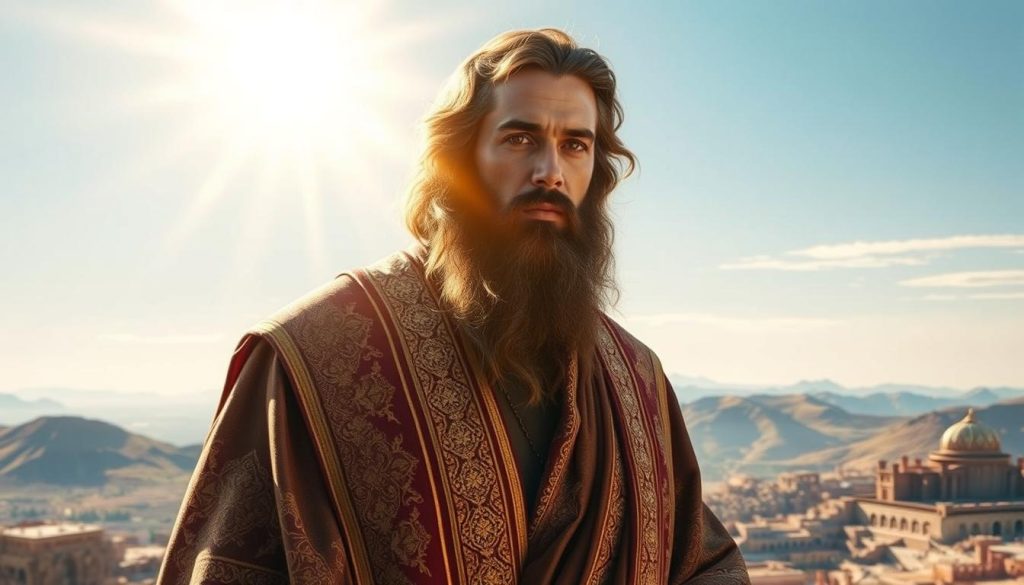
Dawud defeated Jalut with faith and bravery. He trusted in Allah, showing that true strength comes from divine support, not just physical power.
The Psalms, or Zabur, were given to Dawud. They hold divine wisdom and guidance for believers. These scriptures teach us about being righteous, grateful, and remembering Allah.
Dawud ruled with justice and compassion, respecting everyone’s rights. His leadership is a lesson for all leaders and individuals.
| Aspects of Dawud’s Life | Significance |
|---|---|
| Victory Over Jalut | Demonstrates faith and bravery |
| The Psalms (Zabur) | Source of divine wisdom and guidance |
| Just Leadership | Model for fairness and compassion |
In conclusion, Prophet Dawud’s story is full of faith, courage, and wisdom. It teaches us valuable lessons. His legacy as a righteous king and a major prophet of Islam inspires and guides us.
The story of Prophet Sulaiman shows the power of wisdom and fair leadership in Islam. He is one of the major prophets of Islam, and his life and rule teach us valuable lessons.
Prophet Sulaiman had knowledge and wisdom from Allah. The Quran says he could talk to animals and birds. This special gift showed his connection to nature and his prophetic role.
Wisdom in Leadership: Sulaiman’s wisdom went beyond nature. It guided his leadership too. He made fair decisions, solving tough problems easily. His wisdom showed the value of seeking knowledge and guidance in leadership.
Sulaiman’s kingdom was vast and rich. He controlled humans, jinns, and nature. The Quran tells us he made jinns build and dive for pearls. His power over different beings showed his prophetic strength and divine will.
“And to Solomon We gave understanding of the matter. And to each We gave judgment and knowledge” (Quran 21:79).
Even with great power and wealth, Sulaiman stayed humble. He knew his gifts came from Allah. This teaches us that true strength is not in wealth or power but in fearing and worshipping Allah.
| Aspects of Sulaiman’s Life | Lesson Derived |
|---|---|
| Wisdom and Knowledge | Importance of seeking knowledge in leadership |
| Control over Elements and Beings | Recognition of divine power and will |
| Humility Despite Wealth | True strength lies in the fear and worship of Allah |
In the Quran, Prophet Isa is seen as a key prophet. His birth and early life were filled with miracles, which show his importance.
He brought a message of peace and the belief in one God to his people.
His story is a key part of Islamic faith. It highlights the miraculous nature of his birth and his message.
Prophet Isa’s birth was a miracle. He was born to the Virgin Mary through God’s power. The Quran says he did miracles from a young age.
Prophet Isa was given the Gospel (Injil), a divine scripture in Islam. His message was about the oneness of God and living righteously.
The Injil guides people to the right path. It emphasises the monotheistic message of Islam.
Islamic belief says the Prophet Isa was not crucified. Instead, he was raised to God, known as the ascension. This is based on the Quran.
In Islamic eschatology, Prophet Isa is believed to return before the world’s end. His return is a sign of the end times, linked to the defeat of falsehood and the start of justice.
This belief shows Isa’s message and mission are important in Islam.
Prophet Muhammad’s role in Islam is huge. It covers his life before he became a prophet, how he got the Quran, and his work in starting the first Muslim community. His teachings and legacy help millions of followers worldwide.
Before becoming a prophet, Muhammad was known for being honest and trustworthy. People called him Al-Amin (the trustworthy). He often went to Hira’s cave to think deeply.
The Quran’s revelation started when Muhammad was 40. The angel Gabriel showed up in Hira’s cave. This was the start of his prophethood and the Quran’s message to guide humanity.
Muhammad did more than just receive revelations. He also started the first Muslim community. This community, in Medina, was based on justice, equality, and kindness, as the Quran teaches.
In his last sermon, Muhammad stressed following the Quran and his teachings, the Sunnah. He talked about kindness, respect, and justice for everyone. As “The last messenger”, his message is a timeless guide for believers.
“All mankind is from Adam and Eve, an Arab has no superiority over a non-Arab nor a non-Arab has any superiority over an Arab; a white has no superiority over a black nor a black has any superiority over white; none has superiority over another except by piety and good deeds.”
This sermon summed up his teachings. It highlighted equality, compassion, and the value of faith.
The major prophets of Islam, like Adam, Nuh, Ibrahim, Musa, Dawud, Sulaiman, Isa, and Muhammad, share a key message. This message has guided believers for centuries. Their stories in the Quran highlight the value of faith, perseverance, and doing what is right.
These prophets all called for the belief in one God and were messengers of Allah. They are not just figures from the past but also inspire and guide Muslims today. By learning from their lives and teachings, we understand Islam better and its core values.
The impact of the major prophets of Islam is felt today, not just in the past. For those wanting to connect more with their faith, the beautiful art of the prophets can be a great addition. You can find Islamic art, including calligraphy of the Prophet Muhammad (PBUH), on our website at Islamic Wall Arts.


